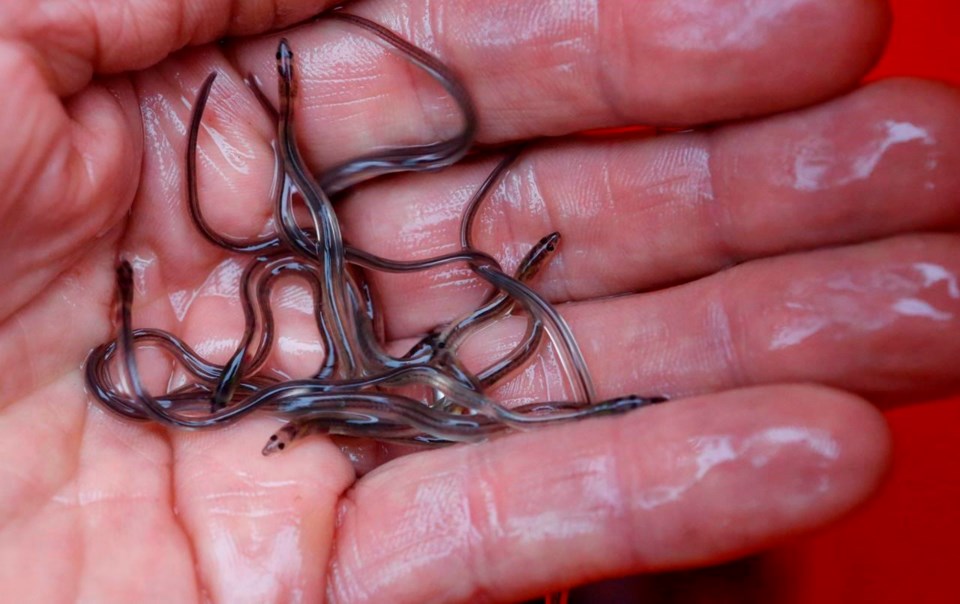HALIFAX — Ottawa’s decision to shut down the lucrative but contentious baby eel fishery in the Maritimes has effectively ended the 2023 season, says a commercial licence holder in southwestern Nova Scotia.
Brian Giroux, of Shelburne Elver, a fishing co-op that employs 39 people, said the mandatory 45-day closure announced by the Department of Fisheries and Oceans on Saturday will largely run out a season that normally wraps up in early June.
“Illegal activities that (DFO) failed to control have taken away the fishing from the licensed and legal fishing,” Giroux said in an interview Monday.
The federal department closed the fishery on rivers in Nova Scotia and New Brunswick, citing safety and conservation concerns. The closure was announced following ongoing complaints from commercial and First Nations fishers about growing violence and intimidation in the fishery.
Michel Samson, a lawyer who represents Wine Harbour Fisheries on Nova Scotia’s eastern shore, said his client only caught about 33 kilograms of its 1,000-kilogram quota. It began fishing later because of migratory patterns that see the eels arrive later in that area of the province.
Samson said it’s estimated that all of the annual quota for the region has been used up in any event, with about half taken by poachers.Â
“Almost 5,000 kilograms were not accounted for -- they were not caught by the commercial licence holders, which means they were caught illegally,” Samson said in an interview Tuesday. “DFO lost control of a situation that in many ways they created.”
The total allowable catch is 9,960 kilograms -- a limit that has been in place since 2005. The American eel was designated as threatened by the Committee on the Status of Endangered Wildlife in Canada in 2012.
The young eels are shipped live to Asian markets such as China and Japan, where they are grown for food. Growing demand has made them a prized commodity, with prices reaching $5,000 per kilogram in 2022. But, Giroux said the illegal catch has affected prices this year which have dropped closer to $4,000 per kilogram.
In a statement released Monday, the six chiefs of the Wolastoqey Nation in New Brunswick called for an “urgent” meeting with federal Fisheries Minister Joyce Murray “to reiterate that our communal commercial elver licence must remain in full effect.”
“We strongly oppose her unilateral decision to shut down all fishing of elvers by First Nations, including the Wolastoqey Nation, and non-Indigenous commercial fishers, for at least 45 days,” the chiefs said. They represent the Madawaska Maliseet, Tobique, Woodstock, Kingsclear, St. Mary’s, and Oromocto First Nations.
They said the decision to close fishing in Wolastoqey territory and in Nova Scotia was “unjust and without basis” and was done without consultation. The chiefs said the minister has made a “serious oversight that unfairly punishes Wolastoqey fishers.”
In Ottawa, Murray told reporters Monday that the decision to close the fishery was made after her department did “everything it could.”
“The compliance enforcement was beefed up, we doubled it, over 740 enforcement operations," she said. "We’ve had numerous arrests. It’s simply too dangerous for people, as well as my concern about the stock."
The minister confirmed that poachers were coming from outside the Maritimes, and even from outside Canada, in what amounted to a “huge escalation” of illegal fishing.
“So, it was simply too dangerous to let this continue, and we’ll have to really reflect on how this fishery is managed for next year,” she said.
Giroux said that although similar violence led to a closure of the fishery in 2020, the situation this year is the worst he’s seen.
“There’s been gunplay and beatings,” he said. “There are literally hundreds of illegal players trying to hide amongst about 400 legal fishers.”
Giroux said fishers in his area of Nova Scotia have noticed vehicles with New Brunswick, Quebec and Ontario licence plates near fishing spots, as well some from some U.S. states such as Maine and New Hampshire.
The increase in illegal fishing only added to tension over quota allocations for the 2023 season.
For the second consecutive year, Ottawa gave Indigenous fishers 14 per cent of the commercial quota as it seeks to increase their access to the fishery in recognition of a treaty right to make a moderate living from fishing.
Giroux said the federal government’s move has cost his co-op about $1 million worth of quota annually this year and last. He added that he is part of a court challenge arguing the federal policy failed to compensate commercial fishers. “They refused to buy us out with any kind of a legitimate offer,” he said.
Commercial fishers maintain the majority of what they contend is poaching is done by First Nations fishers who are not part of federal agreements, although the non-licensed Indigenous fishers maintain they are also asserting their treaty rights. However, Giroux said more “non-First Nations actors” are getting involved in illicit trade.
“At least a quarter, maybe more, are non-First Nations who are just a criminal element taking advantage of the fact that this is fairly lucrative,” he said.
This report by The Canadian Press was first published April 18, 2023.
Keith Doucette, The Canadian Press



